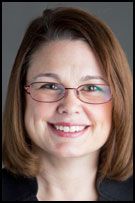Sara Gelser: The election is over; what happens next?

By SARA GELSER
State Senator from Corvallis
On Tuesday, we did something extraordinary. We had a free and fair election.
All across the United States, people cast their ballots — and along with them their hopes and expectations. Though I accept the results, I was disappointed by the outcome of the presidential election.
Like many reading this, I am wrestling with fear, frustration, grief and many questions about what comes next. I worry there are vulnerable people with more to lose in the months ahead than most of us can imagine.
I also know some reading this have a different perspective. They are elated by the outcome of the presidential election, believing the leadership of the president-elect will resolve very real challenges in their lives and those of others they believe have been left behind in our economy.
This tension is not an accident. Our democratic process is designed to bring our differences into focus. Disagreement and debate are a fundamental part of a process that is meant to be everchanging.
For too many of us, democracy has become a contact sport where the score is tallied at the ballot box. We proceed as though there is just one winner and then the game is over, at least until the next election rolls around.
It doesn’t and shouldn’t work that way. As Philadelphia City Councilor Nicolas O’Rourke said Wednesday, “Voting is the last thing we do in a functioning democracy.”
In other words, democracy is not defined by whom we elect. It is defined by what we do and how we show up for each other. Our votes select our leaders, but our actions shape our communities, our culture and the future we pass on to our children.
That’s why the greatest danger to our nation’s future isn’t any particular leader or policy. The greatest threat is having communities so divided and discourse so intolerable that we throw up our hands in despair and disengage.
So what happens next? That’s up to all of us.
- We will decide how we welcome newcomers to our communities and how we honor the wisdom of those who came before us.
- We will decide how to care for our elders, our children and those that need a little extra help.
- We will decide how to respond to those struggling to pay their utilities, put groceries in the refrigerator and shoes on their children’s feet.
- We will decide whether to lift our voices collectively against hate and violence or whether to simply look the other way.
- We will decide whether to dismiss each other as uneducated, misinformed and uncaring or dare to listen with curiosity to what shapes the views of those with whom we disagree.
- We will decide whether to shrink from the moment and disengage from the process, or lean into the responsibility and opportunity to do what we can, where we can and when we can.
As a legislator, I am committed to working even harder, listening and learning from those who see the world differently and creating respectful spaces for community dialogue.
My office will continue to welcome anyone who needs help or has an idea to share and will treat each person that writes, calls or visits with hospitality, honesty and respect. When we fall short, I ask you to help us by letting us know so that we can do better.
There are some principles I can’t compromise. I oppose political violence and reject hate in all its forms. I emphatically oppose mass deportation, militarized suppression of political dissent and the criminalization of homelessness and mental illness. I will always protect the right of each person to make his or her own reproductive health choices.
These values are shared by many across the political spectrum, including some who marked their ballots differently. We can and must come together across party lines to stand up for these values, to protect our neighbors, and to defend our democratic institutions whenever they are threatened by any person, policy or event.
To those most affected by extreme proposals floated during this campaign cycle — particularly those in the immigrant, disability, LGBTQ and BIPOC communities — I will continue to stand with you, using whatever power I have to amplify your power.
Whatever your perspective, I urge you to lean into building the best future you can imagine for our state and nation.
It’s easy to feel our individual votes, actions or advocacy don’t really matter. Yet, we don’t have to look any further than right here in Oregon to prove people in significant political minorities can drive change.
Democrats in bright red Linn County knocked on tens of thousands of doors to cobble together enough new votes to secure victory for Congresswoman-elect Janelle Bynum. That work may ultimately determine control of the U.S. House.
Meanwhile, Republicans in deep blue Oregon helped President-Elect Trump claim the popular vote nationwide. They helped put to rest any question about the choice of the nation’s majority in the 2024 election.
These voters had power. So do you.






Comments